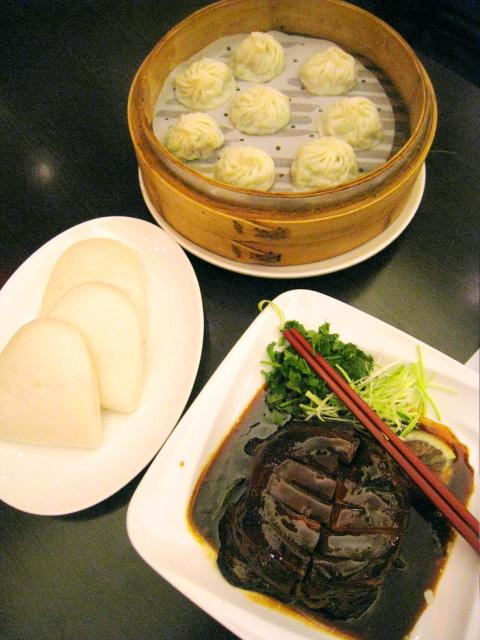The dull, concrete National Taiwan University Alumni Club (台大校友會館) building on Jinan Road (濟南路) doesn’t look like it would house a restaurant boasting an acclaimed menu of Jiang-Zhe (short for China’s Jiangsu and Zhejiang provinces) cuisine and Shanghai-style snacks at wallet-friendly prices.
Su Hung Restaurant (蘇杭餐廳) teems with office workers and suit-clad officials from the nearby Ministry of Education (教育部) and Legislative Yuan (立法院) on weekdays, and families and groups of friends on weekends. Reservations are recommended.
Despite its abundant banquet fare, the restaurant is best known for two things: its sponge gourd and shrimp soup dumplings (絲瓜蝦仁湯包, NT$280 for eight) and scallion pancakes (蔥油餅, NT$90). Both can be found in the menu’s snack section. Although the latter seems to be simple street nosh that doesn’t demand much culinary skill, Su Hung impresses by frying the pancake so the surface is scrumptiously crisp and the inside juicy.

Photo: Ho Yi, Taipei Times
With skin that was a little dry and less broth than run-of-the-mill xiaolongbao (小籠包), I was slightly disappointed by the sponge gourd and shrimp dumplings. The natural sweetness of the chopped sponge gourd, however, complemented the minced shrimp well.
All items on the menu’s snack section are currently being sold at half price. (The prices in this review have not been discounted.)
Another signature dish is the braised pork in honey sauce (東坡肉, NT$360), which is tucked in a steamed bun (刈包, NT$20 for one) like a hamburger.
The braised fish belly in soy sauce (紅燒肚膛, NT$240) melts in the mouth and is glazed with a sweet dressing. For soup, the braised tofu with Chinese cabbage served in a clay pot (砂鍋白菜豆腐, NT$280) is a delightfully subtle concoction of clam, tofu, Chinese cabbage, mushroom, shrimp, ham and pork intestine.
Other highlights include the braised crab eggs with tofu (蟹黃豆腐, NT$220), braised pork with bacon, tofu and bamboo shoot served in a clay pot (砂鍋醃篤鮮, NT$380) and braised duck, bamboo and ham soup (杭州老鴨煲, NT$1,280 — must be preordered at least one day in advance).
Service is adequate but a little slow when the restaurant is full. Still, the dining experience is generally pleasant as the space is designed for comfort, with gallery lighting, spacious seating and a neat interior that could be described as modern Chinese chic.
Su Hung is ideal for a family meal that won’t break the bank. It also operates branches in Sindian (新店) and Tianmu (天母). For more information, visit www.suhung.com.tw.

April 14 to April 20 In March 1947, Sising Katadrepan urged the government to drop the “high mountain people” (高山族) designation for Indigenous Taiwanese and refer to them as “Taiwan people” (台灣族). He considered the term derogatory, arguing that it made them sound like animals. The Taiwan Provincial Government agreed to stop using the term, stating that Indigenous Taiwanese suffered all sorts of discrimination and oppression under the Japanese and were forced to live in the mountains as outsiders to society. Now, under the new regime, they would be seen as equals, thus they should be henceforth

Last week, the the National Immigration Agency (NIA) told the legislature that more than 10,000 naturalized Taiwanese citizens from the People’s Republic of China (PRC) risked having their citizenship revoked if they failed to provide proof that they had renounced their Chinese household registration within the next three months. Renunciation is required under the Act Governing Relations Between the People of the Taiwan Area and the Mainland Area (臺灣地區與大陸地區人民關係條例), as amended in 2004, though it was only a legal requirement after 2000. Prior to that, it had been only an administrative requirement since the Nationality Act (國籍法) was established in

Three big changes have transformed the landscape of Taiwan’s local patronage factions: Increasing Democratic Progressive Party (DPP) involvement, rising new factions and the Chinese Nationalist Party’s (KMT) significantly weakened control. GREEN FACTIONS It is said that “south of the Zhuoshui River (濁水溪), there is no blue-green divide,” meaning that from Yunlin County south there is no difference between KMT and DPP politicians. This is not always true, but there is more than a grain of truth to it. Traditionally, DPP factions are viewed as national entities, with their primary function to secure plum positions in the party and government. This is not unusual

US President Donald Trump’s bid to take back control of the Panama Canal has put his counterpart Jose Raul Mulino in a difficult position and revived fears in the Central American country that US military bases will return. After Trump vowed to reclaim the interoceanic waterway from Chinese influence, US Defense Secretary Pete Hegseth signed an agreement with the Mulino administration last week for the US to deploy troops in areas adjacent to the canal. For more than two decades, after handing over control of the strategically vital waterway to Panama in 1999 and dismantling the bases that protected it, Washington has